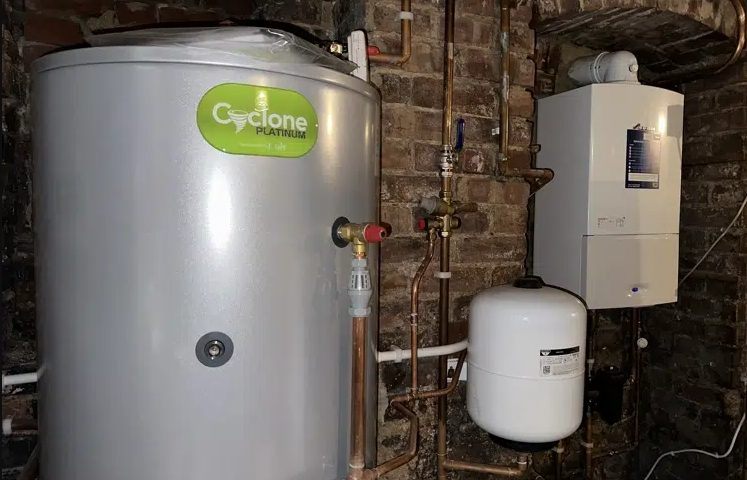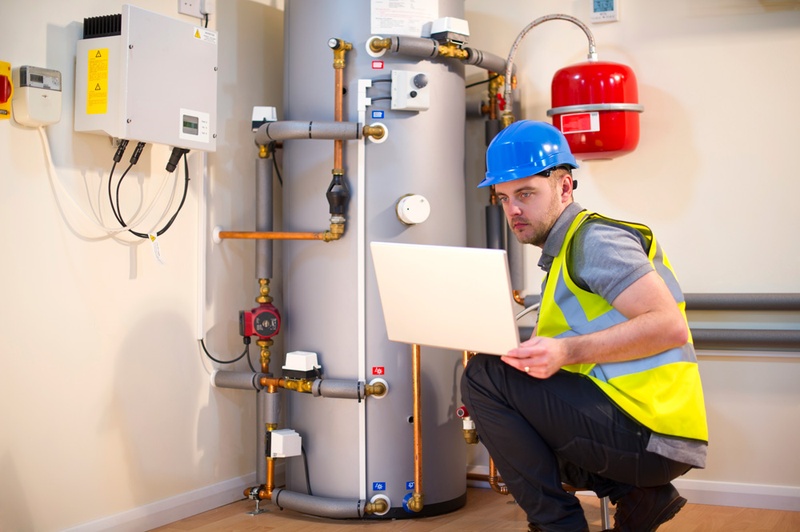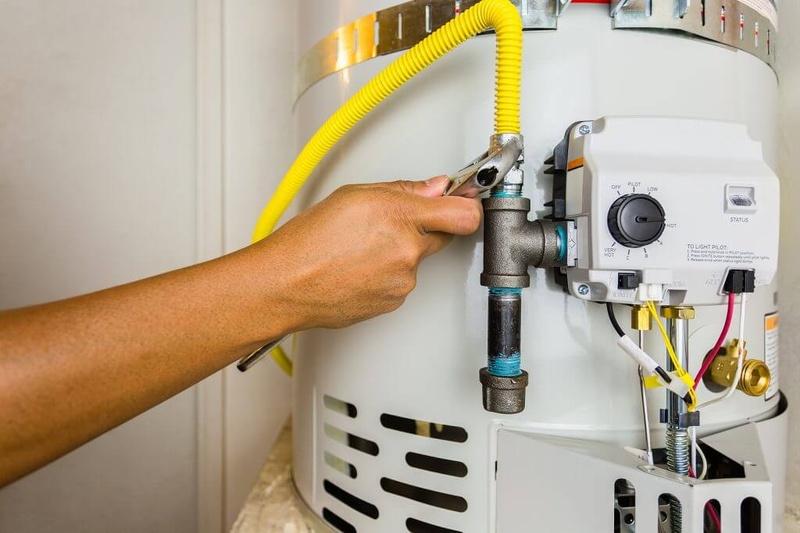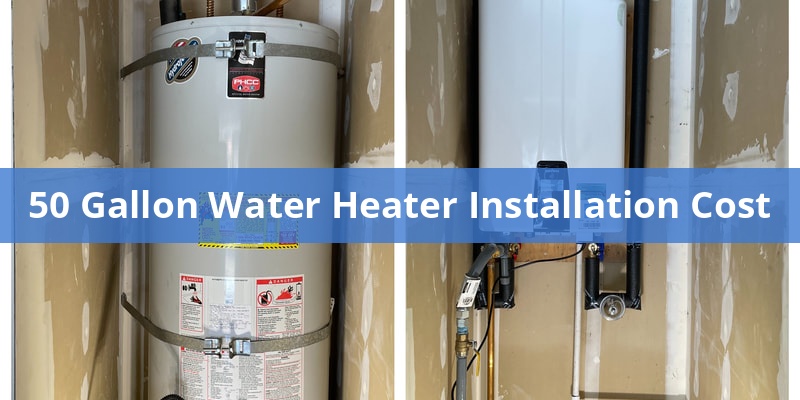Homeowners who are considering such a major upgrade to their homes as the installation of a 50-gallon water heater will want to know the costs involved.
The cost of installing a 50-gallon water heater ranges between 1,000 and 3,500 dollars depending on the type of water heater you are installing, the complexity of the installation and where you live. This is an ultimate guide that dissects all possible costs, including equipment, labor, permits, and other parts, so that you can budget correctly and make a well-informed decision regarding your water heating requirements.
When planning to purchase a new 50 gallons water heater, one should know that the cost of the water heater includes the price of the water heater and the cost of installation. The kind of water heater you select will have a great influence on the total cost whereby the electric type tends to be cheaper to buy but may be more expensive to run compared to the gas type.
| Water Heater Type | Unit Cost | Installation Cost | Total Cost |
|---|---|---|---|
| Conventional Electric | $300-$700 | $400-$900 | $700-$1,600 |
| Conventional Gas | $500-$1,000 | $500-$1,000 | $1,000-$2,000 |
| Hybrid/Heat Pump | $1,200-$2,500 | $500-$1,000 | $1,700-$3,500 |
| Tankless (Equivalent Capacity) | $1,000-$3,000 | $1,000-$1,700 | $2,000-$4,700 |

Labor is usually between 45-150 dollars an hour and most installations are 2-3 hours on a simple replacement and 6-8 hours on a new installation or fuel type conversion. Other expenses can be permits ($50-$200), old units disposal ($25-$100), and upgrades to the existing systems.
Factors Affecting Installation Costs
A number of factors may affect the end cost of your water heater installation. Knowledge of these factors can assist in explaining price quotes and enable you to make cost effective decisions regarding your installation.
Type of Water Heater
The cost factor is the type of water heater. Although traditional electric models are cheaper to purchase, gas heaters tend to offer cheaper long-term costs of operation. Hybrid models are more expensive to buy but can save a lot of energy and may pay off in 2-5 years as a result of lower utility costs.
Conversion Costs
The cost of switching between different types of fuels is very high. Switching to gas might need new gas lines ($500-$1,000), and switching to electric may need electrical upgrades ($300-$800). Such conversions usually take more labor and other permits.
Location and Accessibility
The labor cost can be augmented by 20-30 percent when the installation is done in hard-to-reach areas such as crawl spaces, cramped closets or attics. Installers can also add a surcharge when they have to work in difficult areas or when the installation process needs more assistants to carry equipment without causing accidents.
- Easy access installation: Standard labor rates
- Moderate difficulty access: 10-20% premium
- Difficult access: 20-50% premium
Local Rates and Regulations
Installation prices are quite different in different regions. The cost of labor in such big cities as New York or San Francisco may be 30-50 percent higher than in the countryside. Also, local building codes can mandate certain safety features or installation practices that can influence the cost, like earthquake strapping in earthquake zones or high installations in flood prone areas.
Types of 50-Gallon Water Heaters Compared

All the kinds of water heaters have their own benefits and drawbacks which influence the initial and long-term expenses. It is important to understand these differences so as to make the appropriate choice in terms of your household requirements.
Don’t Overpay for HVAC Services – Call 888-894-0154 Now to Compare Local Quotes!
Conventional Gas Water Heaters
Gas water heaters are fast and they do not stop during power cuts. They are also cheaper to operate than electric models and their annual operating costs are about 200-400 dollars. They are however safer when properly vented and are more expensive to install when there are no gas lines in place.
Conventional Electric Water Heaters
The easiest to install are the electric water heaters, particularly when they are being used to replace old electric water heaters. They do not need venting and they are the cheapest to install. Nevertheless, they are more expensive to operate every year (around 400-600 dollars), and they do not heat water as fast as gas models.
Hybrid/Heat Pump Water Heaters
Hybrid water heaters employ the heat pump technology to move the heat in the air around it to the water, consuming much less electricity than the conventional electric heaters. Although they are more expensive to install, they can save up to 60 percent of energy, and they cost only 150-300 dollars per year to operate.
These units need proper air space (normally 1,000 cubic feet) around them and they perform optimally in an area that is between 40°F and 90°F. Additional space requirements and perhaps a condensate drain may be necessary during installation.
Tankless Water Heaters (Equivalent Capacity)
Although the traditional tankless units are not available in 50-gallon sizes (they are rated by flow rate), high-capacity tankless heaters can deliver the same amount of hot water as a 50-gallon tank. These systems are more expensive to install but have unlimited hot water and save space up to 16 cubic feet. They have a life span of 20+ years as opposed to 10-15 years of the conventional tanks.
| Feature | Gas Tank | Electric Tank | Hybrid | Tankless |
|---|---|---|---|---|
| Initial Cost | Moderate | Low | High | Highest |
| Operating Cost | Low | High | Lowest | Low |
| Lifespan | 8-12 years | 8-12 years | 10-15 years | 20+ years |
| Recovery Rate | Fast | Slow | Moderate | Continuous |
| Space Needs | Large + Venting | Large | Large + Airspace | Compact |
DIY vs. Professional Installation

Most homeowners are interested in knowing whether they can save by installing a water heater on their own. Although DIY installation is cheaper in terms of labor cost ($400-$1,000), it is associated with considerable considerations.
DIY Installation Considerations
Homeowners with plumbing experience can usually only do direct replacements of electric water heaters on a DIY basis. Even at that, poor installation may invalidate warranties, result in water damage, or become safety hazards. The majority of manufacturers suggest professional installation, and some warranties demand it.
- You’ll need tools: pipe wrenches, soldering equipment, electrical testers
- Local permits are still required
- Gas lines should never be modified by non-professionals
- Improper venting of gas heaters can cause carbon monoxide poisoning
- Incorrect electrical connections can cause fires
Benefits of Professional Installation
There are a number of benefits of professional installation besides adequate setup. Certified plumbers make sure that the connections are tight, venting is done correctly and the system is up to local building codes. They normally deal with permits, inspection and disposal of old units and their work is normally accompanied by a labor warranty (usually 1-2 years).
A typical replacement should take most plumbers a day, so your household will spend the least time without hot water. In more complicated installations or when switching between fuel types professional installation is highly advisable and in many cases code required.
Additional Costs to Consider
In addition to the simple installation costs, there are a few other things that can influence your overall budget on water heater replacement. Knowing about these possible expenses allows preventing unpleasant surprises.
Plumbing Upgrades
Old houses might need plumbing repair to fit new water heaters. The typical upgrades are old pipes ($150-$500), shut-off valves ($50-$150), and supply lines ($25-$100). Such enhancements make safety and performance better and avoid future issues.
Expansion Tanks
Most local codes have come to mandate the use of expansion tanks when installing new water heaters. These tanks prevent pressure build up in plumbing and are sold at 40-150 dollars plus installation. In some jurisdictions, expansion tanks are required on any replacement of water heaters, which adds about 150-350 dollars to the overall cost of installation.
Electrical and Gas Upgrades
Electric water heaters with a large capacity might need electrical panel upgrades ($500-$2,000) in case your current circuit is not sufficient to support the load. On the same note, bigger gas models may require larger gas lines ($300-$800) to provide enough fuel. These are infrastructure upgrades, which are major yet in some cases inevitable expenses.
Venting Improvements
Water heaters that use gas need to be vented to get rid of combustion gases. The replacement of the conventional models with the high-efficiency models usually requires new venting systems. Direct venting ($400-$800) or power venting systems ($300-$600) might be necessitated by the current building codes and to have safe operation.
Cost-Saving Strategies
Although the installation of water heater is a serious investment, there are a number of ways to minimize the short-term and long-term expenses.
Timing Your Purchase
In case it is possible, do not use emergency replacements and watch your water heater to see that it is failing. Plumbers usually have high prices on emergency service (20-50 percent). Also, spring or fall off-season installations can be offered with a discount, since it is a slow time of the year to HVAC and plumbing businesses.
Rebates and Incentives
Water heaters that are energy efficient are often subject to rebates and tax incentives. Energy-efficient home improvements can be reimbursed at 10-30 percent of the cost by federal tax credits on qualifying models. Local utilities can also provide extra rebates ($100-$500) on high-efficiency units, especially heat pump water heaters.
- Federal tax credits (check energystar.gov for current offers)
- Utility company rebates (contact your local provider)
- Manufacturer rebates (typically $50-$300)
- State energy efficiency programs
Comparison Shopping
Get at least three estimates by registered plumbers, because the prices may differ by 10-30 percent among the companies on the same job. When comparing quotes, make sure that they cover all elements of installation: permits, disposal and any upgrades needed. Other companies will give package prices when you replace several systems in the home at the same time (such as water heaters and furnaces).
Signs It’s Time to Replace Your Water Heater

It may save money, and avoid the inconvenience of unexpected failures, to recognize when it is more economical to replace than to repair. Majority of water heaters show signs of failure prior to total failure.
Age Considerations
A conventional tank water heater has an average life span of 8-12 years. When your unit is getting close to or past this age range, it is usually more cost-effective to replace it as opposed to repairing it, particularly when efficiency has dropped. The new units produced since 2015 meet more efficient standards and can save 10-20 percent of energy expenses in comparison with the older ones.
Don’t Overpay for HVAC Services – Call 888-894-0154 Now to Compare Local Quotes!
Performance Issues
There are a number of symptoms that show that a water heater is on its way out. The rusty water is an indication of corrosion in the tank and the rumbling sounds are normally a sign of sedimentation. Fluctuating temperatures of the water, apparent leaks, or rising energy costs even with comparable usage habits are all indicators that it is more cost-effective to replace than to keep repairing.
- Insufficient hot water capacity
- Water that appears rusty or discolored
- Strange noises during operation
- Visible corrosion on the tank
- Water leaking around the unit
- Frequent need for repairs
Efficiency Considerations
Although your existing water heater may be performing satisfactorily, a more efficient model will save you a lot of money. The new high-efficiency units have the potential to save you 15-50 percent of the cost of water heating based on the age and type of your current model. In households that consume a lot of hot water, the savings can offset the cost of installation in 3-7 years.
In assessing the alternatives to replacement, look at the Energy Factor (EF) or Uniform Energy Factor (UEF) ratings. The higher the rating the more efficient it is and the heat pump water heaters have a UEF rating of more than 3.0 as opposed to 0.6-0.7 of the standard gas models.
Hiring the Right Installation Professional
The quality of installation and the cost are highly dependent on the installer of your choice. The choice of a qualified professional should be taken with time to have a successful installation and well-functioning system.
Qualifications to Look For
When considering the possible installers, check their licenses, insurance, and experience with your type of water heater. The reputable installers must be ready to give references of past customers. Seek out professionals who have manufacturer certifications, which means they have undergone specific training on a specific brand or technology.
- Valid state/local plumbing license
- Proof of liability insurance and worker’s compensation
- Specific experience with your chosen water heater type
- Positive online reviews and references
- Written warranty on labor (typically 1-2 years)
The majority of good installations include a pre-installation survey in which the plumber comes to examine your existing system and talks to you about possibilities. This consultation will assist in detecting the possible problems prior to the installation day and in making sure that the unit you choose will suit your household.
Knowing everything about the cost of installing a 50-gallon water heater, you will be able to make the right decisions that will help you balance the short-term costs and the long-term efficiency and reliability. Be it a traditional tank model or the newer technology, the correct installation guarantees safe operation and good performance in the future.
How to Get the Best 50 Gallon Water Heater Price?
- To begin with, you should remember that the most important thing about water heater project is the quality of installation. Therefore do not compromise on quality of contractors at the expense of price.
- Second, request at least 3 bids prior to making the decision. To get 3 free estimates of your local water heater contractors, you can click here and this estimate already considers rebates and tax credit and automatically filters unqualified contractors.
How to Get the Best HVAC Prices
- Firstly, keep in mind that installation quality is always the most important thing for residential HVAC project. So never sacrifice contractor quality for a lower price.
- Secondly, remember to look up the latest rebates as we talked above.
- Thirdly, ask for at least 3 bids before you make the decision. You can click here to get 3 free estimates from your local contractors, and this estimate already takes rebates and tax credit into consideration and filter unqualified contractors automatically.
Lastly, once you chose the right contractor, remember to use the tactics from this guide: Homeowners Tactics When Negotiating with HVAC Dealer to get the final best price.




